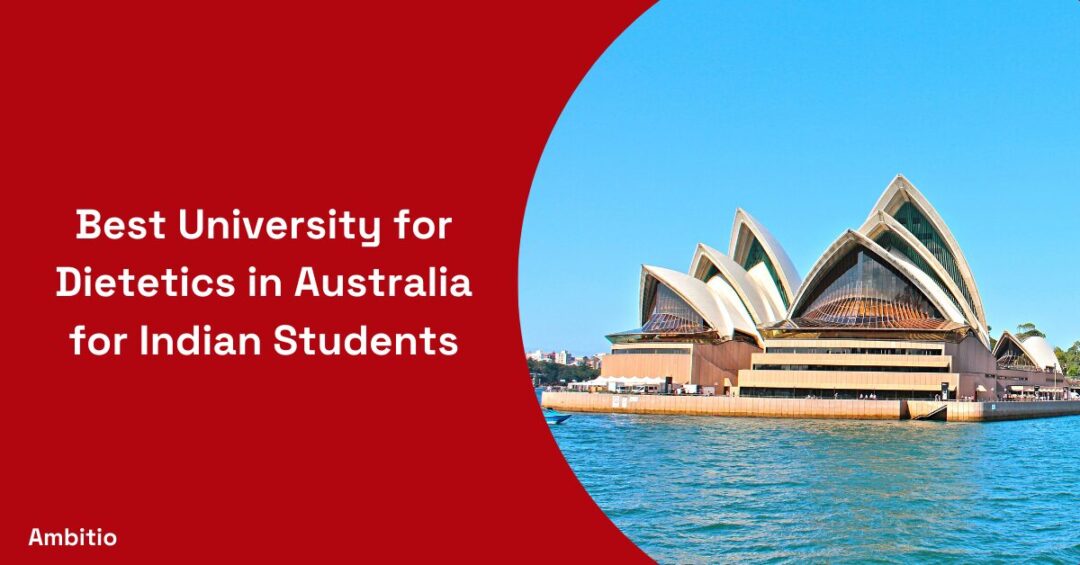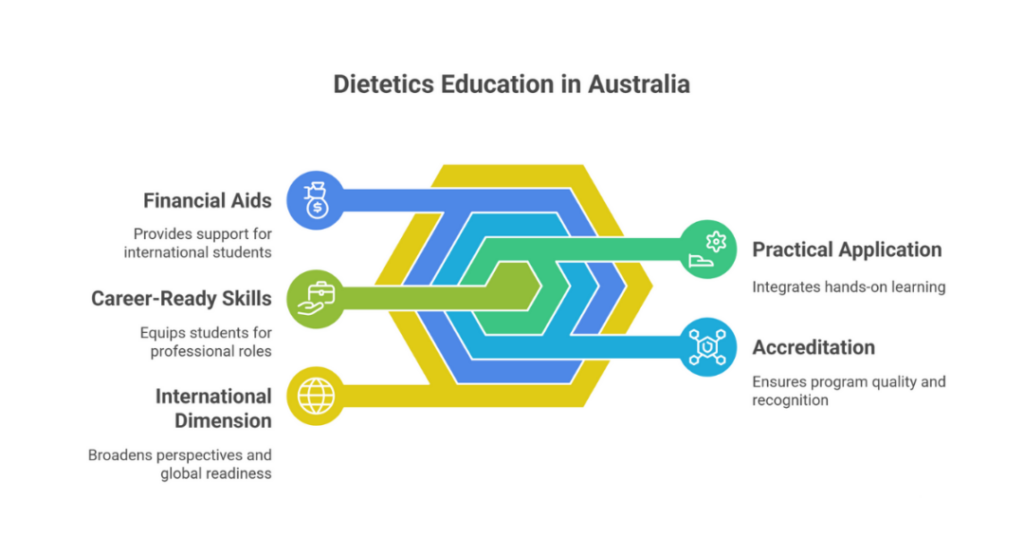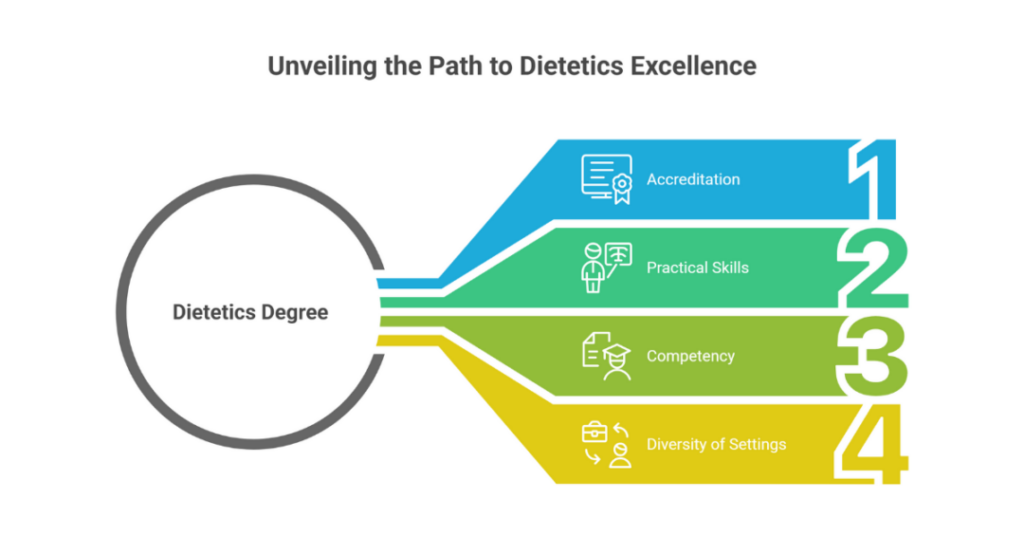6 September 2025
4 minutes read
Best University for Dietetics in Australia for Indian Students (Master of Nutrition and Dietetics University Programs)

Key Takeaways
- Best university for dietetics in Australia ensures accredited courses, clinical placements, and competency-based training for Indian students.
- Best university for dietetics in Australia offers postgraduate and undergraduate study options with global recognition and strong career outcomes.
- Best university for dietetics in Australia provides scholarships, practical skills, and pathways to become an accredited practising dietitian.
Selecting a university that offers a dietetics degree in Australia can create even more choices if you are an Indian student looking to become a competent nutrition professional. Australia offers many globally recognised programs that balance theory with the practical application of learning, which is supported by accreditation from Dietitians Australia.
Nutrition science, human nutrition, food service, and all things health and wellbeing could be related to completing an accredited course. When you study nutrition in Australia, there’s strong placement support, some financial aids offered, all your learning leads to career-ready skills, and there is an international dimension to each of the courses.
Why Go for the Best University for Dietetics in Australia?
Did you know that dietitians remain one of the most needed health professionals in the world? The best universities for a dietetics degree will also provide an accredited qualification in Australia through Dietitians Australia and ensure that you develop practical skills in a clinical setting as an international student.

These PG courses are designed to ensure competency, grounded in evidence-based knowledge and professional practice, when you become an accredited practising dietitian, operating within a diversity of health settings and food industries.
10 Best Universities for Master of Nutrition and Dietetics Courses With Accreditation in Australia
Fun fact: All accredited courses in dietetics prepare students with the national competency standards for their future work and blend of academic studies, meaning that you will always have work readiness in completing your course.
If you are an Indian student looking for a Master of Dietetics, then you have multiple study options available at the best universities in Australia. Entry requirements will vary between courses, but typically they have some entry benchmarks related to GPA (grade point average), academic transcripts, English proficiency tests, and/or statements of purpose.
The below table lists the top universities offering accredited courses:
| Sl. No. | University | Documents Required | Exams Required |
|---|---|---|---|
| 1 | University of Sydney | Transcripts, personal statement, resume | IELTS, TOEFL |
| 2 | Monash University | GPA, statement of purpose, transcripts | IELTS, GRE |
| 3 | University of Queensland | Transcripts, letter of recommendation | IELTS, GMAT |
| 4 | Griffith University | Resume, GPA, transcripts | IELTS, TOEFL |
| 5 | Deakin University | Personal statement, transcripts | IELTS, ACT |
| 6 | Flinders University | Transcripts, resume | IELTS, SAT |
| 7 | University of Wollongong | Statement of purpose, transcripts | IELTS, GRE |
| 8 | La Trobe University | GPA, transcripts, resume | IELTS, TOEFL |
| 9 | Curtin University | Transcripts, letter of recommendation | IELTS, GMAT |
| 10 | University of Newcastle | Transcripts, statement of purpose | IELTS, TOEFL |
What are Some Popular Courses Offered at the Best University for Dietetics?
Fun fact: Bachelor of nutrition is often a pathway to further PG study. The best universities for nutrition and dietetics in Australia offer a wide variety of nutrition courses, including PG and tertiary studies.

Below is a comparison of some of the most popular courses available.
| Course | Level | Focus Area |
| Bachelor of Nutrition | Undergraduate | Food and health, food science |
| Master of Nutrition and Dietetics | Postgraduate | Medical nutrition therapy, community nutrition |
| Master of Dietetics | Postgraduate | Clinical placements, dietetic practice |
| Nutrition Science | Undergraduate | Human physiology, biochemistry, understanding of nutrition |
| Public Health Nutrition | Postgraduate | Community and public health, food choices |
What are the Entry Requirements for Indian Students at Universities in Australia?
As an international student, did you know that for Australian universities academic transcripts and English language ability weigh equally for entry requirements? At least for a graduate degree in dietetics or PG course, many of these requirements have, at the very least, a minimum GPA threshold, a statement of purpose, and proof of English language ability.
Below are some common entry requirements for Australian universities and a comparison.
| Requirement | Details |
| GPA | Minimum 5.0 on a 7-point scale (varies by university) |
| English Proficiency | IELTS, TOEFL, or equivalent scores |
| Supporting Documents | Transcripts, resume, letter of recommendation |
| Additional Submissions | Personal statement or statement of purpose |
| Standardised Tests | ACT, GRE, GMAT, SAT (depending on course) |
Scholarship Options for Indian Students at Universities in Australia
Fun fact: The Australian government and universities award millions of dollars each academic year on financial aids to international students. Financial aids for Indian students with food and nutrition or dietetics courses with financial aids make it easier through reduced tuition-fees and study load.
Many financial aids connect to academic achievement, professional practice placements, and community and public health contribution areas.
Below is a summary of popular financial aid types:
| Scholarship-Type | Offered By | Benefits |
| Australia Awards Scholarship | Australian Government | Full tuition-fees, living expenses, travel allowance |
| Destination Australia Scholarship | Tertiary Institutions | Upto AUD 15,000 annually |
| Vice Chancellor’s International Scholarship | Leading Universities | Partial tuition fee waiver |
| Faculty-Specific Nutrition Scholarship | Selected Universities | Covers part of tuition fees for nutrition courses |
| Research Training Program | Government + Universities | Supports PG research in food innovation and human nutrition |
Conclusion
Australia’s accredited course options in nutrition and dietetics prepare Indian students to be a qualified nutrition professional with practical learning, clinical placements, and supervised professional practice. From food service systems to medical nutrition therapy, these masters courses cover all aspects of the science of nutrition and the practice of dietetics.
If you are looking to study abroad, and want the best possible guidance for your study abroad adventure, connect with Ambitio today to ensure your study abroad process is seamless and successful.
FAQs
Which is the best university for dietetics in Australia for Indian students?
The best university for dietetics in Australia for Indian students is the University of Sydney, as it offers an accredited course, excellent clinical placements, and international recognition.
How can I choose the best university for dietetics in Australia?
You can choose the best university for dietetics in Australia by comparing accreditation, entry requirements, tuition fees, placement opportunities, and available scholarships.
What qualifications do I need to get into the best university for dietetics in Australia?
To enter the best university for dietetics in Australia, Indian students generally need a strong GPA, English proficiency tests like IELTS or TOEFL, and supporting documents such as transcripts and a statement of purpose.
Is the best university for dietetics in Australia accredited by Dietitians Australia?
Yes, the best university for dietetics in Australia offers programs accredited by Dietitians Australia, which allows graduates to become accredited practising dietitians.
What career options are available after graduating from the best university for dietetics in Australia?
Graduates from the best university for dietetics in Australia can work in public health nutrition, aged care facilities, food industry roles, clinical dietetics, and community and public health sectors.
Can international students apply for scholarships at the best university for dietetics in Australia?
Yes, international students can apply for scholarships at the best university for dietetics in Australia, with options like Australia Awards and university-specific funding reducing tuition fees.
Does the best university for dietetics in Australia provide hands-on experience?
Yes, the best university for dietetics in Australia includes hands-on experience through professional practice placements, clinical placements, and community nutrition projects.

You can study at top universities worldwide!
Get expert tips and tricks to get into top universities with a free expert session.
Book Your Free 30-Minute Session Now! Book a call now




























